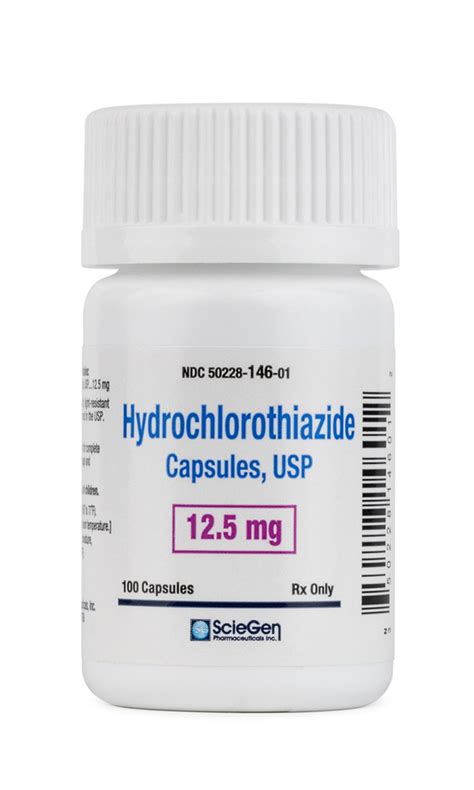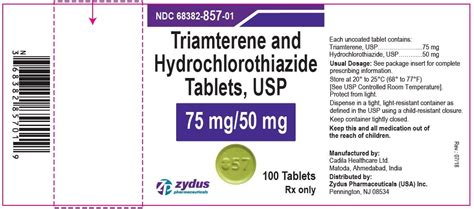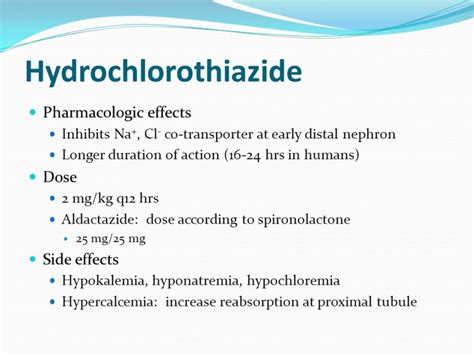Intro
Discover the Hydrochlorothiazide Medication Guide, covering uses, side effects, and interactions of this diuretic medication, including blood pressure management, edema treatment, and hypertension control.
Hydrochlorothiazide is a medication that has been widely used for decades to treat various health conditions, including high blood pressure, edema, and certain types of kidney and liver diseases. It belongs to a class of medications known as thiazide diuretics, which work by helping the kidneys remove excess fluid and salt from the body. In this article, we will delve into the world of hydrochlorothiazide, exploring its uses, benefits, side effects, and interactions, as well as providing practical tips for those taking this medication.
The importance of hydrochlorothiazide cannot be overstated, as it has been a cornerstone in the treatment of hypertension and other cardiovascular diseases. By reducing blood pressure, hydrochlorothiazide helps to decrease the risk of heart attacks, strokes, and kidney damage. Additionally, its diuretic properties make it an effective treatment for edema, a condition characterized by excessive fluid retention in the body. With its widespread use, it is essential to understand the ins and outs of hydrochlorothiazide, including its mechanism of action, potential side effects, and interactions with other medications.
As we explore the world of hydrochlorothiazide, it is crucial to recognize the significance of this medication in modern medicine. With millions of people worldwide taking hydrochlorothiazide to manage their blood pressure and other health conditions, it is essential to provide accurate and reliable information about this medication. In this article, we will provide an in-depth look at hydrochlorothiazide, including its uses, benefits, and potential risks, as well as practical tips for those taking this medication. Whether you are a healthcare professional or a patient, this article aims to provide you with a comprehensive understanding of hydrochlorothiazide and its role in modern medicine.
What is Hydrochlorothiazide?

How Does Hydrochlorothiazide Work?
Hydrochlorothiazide works by binding to the sodium-chloride cotransporter in the kidneys, which prevents the reabsorption of sodium and chloride ions. This action leads to an increase in the amount of sodium and chloride ions in the urine, which helps to remove excess fluid from the body. Additionally, hydrochlorothiazide increases the production of prostaglandins, which are hormone-like substances that help to relax blood vessels and reduce blood pressure.Uses of Hydrochlorothiazide

Hydrochlorothiazide is often used in combination with other medications to treat these conditions. For example, it may be used with beta blockers or ACE inhibitors to treat high blood pressure, or with loop diuretics to treat edema.
Benefits of Hydrochlorothiazide
The benefits of hydrochlorothiazide include: * Lowering blood pressure and reducing the risk of cardiovascular disease * Reducing edema and improving symptoms of kidney and liver disease * Increasing urine production and helping to remove excess fluid from the body * Improving symptoms of heart failure and reducing the risk of hospitalizationOverall, hydrochlorothiazide is an effective medication for treating a variety of health conditions, and its benefits make it a popular choice among healthcare professionals.
Side Effects of Hydrochlorothiazide

In rare cases, hydrochlorothiazide can cause more serious side effects, such as:
- Allergic reactions (hives, itching, swelling)
- Electrolyte imbalances (low potassium, low sodium)
- Kidney damage or worsening kidney function
- Increased risk of dehydration and heat stroke
It is essential to talk to your healthcare provider if you experience any side effects while taking hydrochlorothiazide.
Interactions with Other Medications
Hydrochlorothiazide can interact with other medications, including: * Beta blockers and ACE inhibitors (increased risk of hypotension) * Loop diuretics (increased risk of electrolyte imbalances) * Nonsteroidal anti-inflammatory drugs (NSAIDs) (increased risk of kidney damage) * Lithium (increased risk of lithium toxicity)It is crucial to inform your healthcare provider about all medications you are taking, including over-the-counter medications and supplements, to minimize the risk of interactions.
Practical Tips for Taking Hydrochlorothiazide

Additionally, it is essential to:
- Follow a low-sodium diet to minimize the risk of electrolyte imbalances
- Avoid strenuous exercise or activities that can cause dehydration
- Wear loose, comfortable clothing to minimize the risk of heat stroke
By following these tips, you can minimize the risk of side effects and interactions and maximize the benefits of hydrochlorothiazide.
Conclusion and Final Thoughts
In conclusion, hydrochlorothiazide is a widely used medication that has been shown to be effective in treating a variety of health conditions, including high blood pressure, edema, and kidney and liver disease. While it can cause side effects and interact with other medications, the benefits of hydrochlorothiazide make it a popular choice among healthcare professionals. By understanding how hydrochlorothiazide works, its uses and benefits, and its potential side effects and interactions, you can make informed decisions about your health and well-being. Remember to always follow the instructions of your healthcare provider and to monitor your blood pressure and urine output regularly.We invite you to share your thoughts and experiences with hydrochlorothiazide in the comments section below. Have you taken hydrochlorothiazide for a health condition? What were your experiences with the medication? Do you have any questions or concerns about hydrochlorothiazide? Share your story and let's start a conversation!
What is the most common side effect of hydrochlorothiazide?
+The most common side effect of hydrochlorothiazide is increased urination, which can occur in up to 50% of patients taking the medication.
Can I take hydrochlorothiazide with other medications?
+Yes, hydrochlorothiazide can be taken with other medications, but it is essential to inform your healthcare provider about all medications you are taking to minimize the risk of interactions.
How long does it take for hydrochlorothiazide to start working?
+Hydrochlorothiazide can start working within a few days to a week after starting treatment, but it may take several weeks to reach its full effect.
